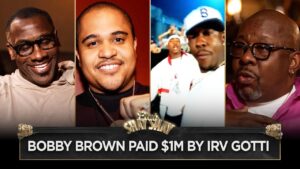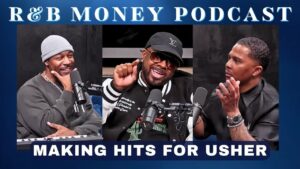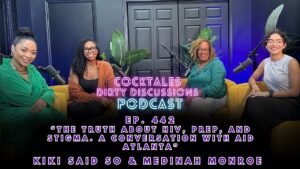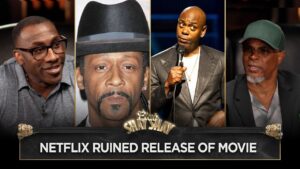In a milestone 150th episode of the R&B Money Podcast, hosts Tank and J. Valentine sit down with music mogul Jermaine Dupri, who pulls back the curtain on the creative process behind some of R&B’s most defining records — from 8701 to Confessions. Known for crafting timeless records and shaping artists into superstars, JD brings listeners into the room where the magic happened.
The Birth of “U Got It Bad”
Around the year 2000, JD was feeling the heat — and not just creatively. He had just built his Atlanta-based Southside Studio and was already calculating how to make it pay off. That urgency birthed a new mission: to help Usher take the next step beyond 8701.
He called in Bryan-Michael Cox, a producer eager to get in the room with Usher again. JD’s vision was to evolve the slow jam aesthetic of “Nice and Slow” into something equally sultry, but fresh.
That’s when fate — and a phone call — intervened. During a session, Usher had a heated argument with his girlfriend and stormed out. JD watched the drama unfold and instantly knew he had a concept. “This dude got it bad,” he thought. That real moment sparked lyrics about calling back, sitting on the steps, and love-sick frustration — all captured in what would become one of Usher’s signature ballads.
Humility Over Hype: JD’s Creative Philosophy
Despite his accolades, JD credits his success to a relentless pursuit of authenticity — and never assuming he’s got a hit until the crowd tells him so. “I don’t care what I think. If the people ain’t reacting, it’s not done yet,” he says. That humility fuels his hustle, especially when critics question whether he can do it again. “I always feel like somebody’s daring me to top myself,” he adds.
Confessions: From Label Doubt to R&B Masterpiece
After the success of 8701, Usher’s next project needed more than just songs — it needed narrative weight. According to JD, LA Reid told Usher bluntly, “You’re not interesting enough right now.” The comment stung, but JD knew what it meant: Usher needed to let people feel something real.
So JD leaned into the emotion. When Usher described the ache of a recent breakup — “like it burned his soul” — JD went to work. Initially unsure of how to spin “burn” into something cool, he eventually landed on the phrase “Let it burn.” It clicked, and Usher was floored by how accurately it mirrored his pain.
Still, not everyone saw the vision. LA Reid initially didn’t think “Burn” was single-worthy — but JD trusted the truth in the track.
Real Life, Real Lyrics: The Making of “Confessions Pt. I” & II
While recording in L.A., JD and Usher worked out of Brandon’s Way studio. Usher, needing focus away from Atlanta’s distractions, pushed JD to leave his home base — something JD rarely did.
It was in L.A. that JD heard a friend casually say, “It’s all bad.” That phrase stuck. Inspired, JD jumped in his Lamborghini and drove through Beverly Boulevard, channeling his surroundings into lyrics. He crafted the first verse of what would become “Confessions Pt. I,” pulling in visuals from his own life and the L.A. scene.
But the story didn’t stop there.
Usher asked, “What happens next?” And as life would have it, JD had just gone through the exact scenario the song hinted at: he’d gotten another woman pregnant and confessed it to his girlfriend via voicemail.
“I wrote ‘Confessions Pt. II’ in like five minutes,” JD says, because it wasn’t fiction — it was his real life.
Ironically, Part II was written and recorded before Part I was ever released. Originally titled “All Bad,” the first song got pulled from the Confessions album by LA Reid. The storytelling gap confused JD until they decided to bridge the narrative in the Confessions Pt. II music video by inserting the verse from Part I.
The result? A cultural moment and an album that redefined R&B storytelling.
Advice to Songwriters: Live First, Write Later
JD closes out the episode with simple but powerful advice for aspiring songwriters: live life. The good, the bad, the dramatic — it all fuels creativity. “If nothing’s happening in your life,” JD says, “go make something happen. Then write about it.”
Because as JD proved time and time again — the best songs are the ones rooted in reality.






